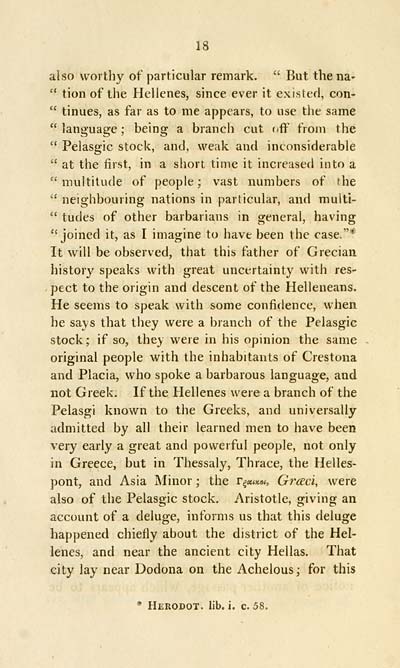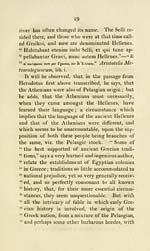Download files
Complete book:
Individual page:
Thumbnail gallery: Grid view | List view

18
also \vorthy of particular remark. "• But the na-
" tion of the Hellenes, since ever it existed, con-
" tinues, as far as to me appears, to use the same
" language ; being a branch cut (.ff from the
" Peiasgic stock, and, weak and inconsiderable
" at the first, in a short time it increased into a
" multitude of people ; vast numbers of the
" neighbouring nations in particular, and muiti-
" tudes of other barbarians in general, having
"joined it, as I imagine to have been the case."*
It will be observed, that this father of Grecian
history speaks with great uncertainty with res-
pect to the origin and descent of the Helleneans.
He seems to speak with some confidence, when
he says that they were a branch of the Peiasgic
stock ; if so, they were in his opinion the same
original people with the inhabitants of Crestona
and Placia, who spoke a barbarous language, and
not Greek. If the Hellenes were a branch of the
Pelasgi known to the Greeks, and universally
admitted by all their learned men to have been
very early a great and powerful people, not only
in Greece, but in Thessaly, Thrace, the Helles-
pont, and Asia JMinor ; the rg««o<, Grceci, were
also of the Peiasgic stock. Aristotle, giving an
account of a deluge, informs us that this deluge
happened chiefly about the district of the Hel-
lenes, and near the ancient city Hellas. That
city lay near Dodona on the Achelous; for this
* Herodot. lib. i. c. 58.
also \vorthy of particular remark. "• But the na-
" tion of the Hellenes, since ever it existed, con-
" tinues, as far as to me appears, to use the same
" language ; being a branch cut (.ff from the
" Peiasgic stock, and, weak and inconsiderable
" at the first, in a short time it increased into a
" multitude of people ; vast numbers of the
" neighbouring nations in particular, and muiti-
" tudes of other barbarians in general, having
"joined it, as I imagine to have been the case."*
It will be observed, that this father of Grecian
history speaks with great uncertainty with res-
pect to the origin and descent of the Helleneans.
He seems to speak with some confidence, when
he says that they were a branch of the Peiasgic
stock ; if so, they were in his opinion the same
original people with the inhabitants of Crestona
and Placia, who spoke a barbarous language, and
not Greek. If the Hellenes were a branch of the
Pelasgi known to the Greeks, and universally
admitted by all their learned men to have been
very early a great and powerful people, not only
in Greece, but in Thessaly, Thrace, the Helles-
pont, and Asia JMinor ; the rg««o<, Grceci, were
also of the Peiasgic stock. Aristotle, giving an
account of a deluge, informs us that this deluge
happened chiefly about the district of the Hel-
lenes, and near the ancient city Hellas. That
city lay near Dodona on the Achelous; for this
* Herodot. lib. i. c. 58.
Set display mode to: Large image | Transcription
Images and transcriptions on this page, including medium image downloads, may be used under the Creative Commons Attribution 4.0 International Licence unless otherwise stated. ![]()
| Early Gaelic Book Collections > Ossian Collection > Thoughts on the origin and descent of the Gael > (30) |
|---|
| Permanent URL | https://digital.nls.uk/82234804 |
|---|
| Description | Selected books from the Ossian Collection of 327 volumes, originally assembled by J. Norman Methven of Perth. Different editions and translations of James MacPherson's epic poem 'Ossian', some with a map of the 'Kingdom of Connor'. Also secondary material relating to Ossianic poetry and the Ossian controversy. |
|---|
| Description | Selected items from five 'Special and Named Printed Collections'. Includes books in Gaelic and other Celtic languages, works about the Gaels, their languages, literature, culture and history. |
|---|

